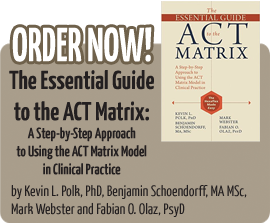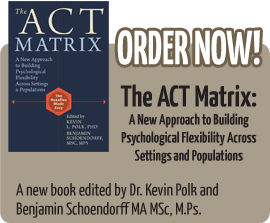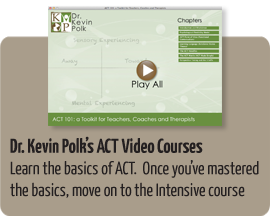Psychological inflexibility, aka “feeling stuck,” is a byproduct of words. We start right out of the womb as flexible little learners, soaking up information through our five senses, and finally relating that information to words. As time goes by the words get stronger and stronger. We pay less attention to our five senses experiencing and more attention to the words in our heads. Of course the words are wonderful and allow us to communicate with others. However, the price we pay is less flexible learning. That is, we can believe what the words in our heads are telling us instead of integrating the information that is also available to us through the five senses. Most of the time less flexible learning is no big deal, but at other times it keeps us stuck doing things that just don’t work for valued living. The trick is to let go of the words a bit and pay more attention to what our five senses are letting us know about the world. One of the easiest ways to do that is by listening for flexibility.
[The following is an experiment. If you get a chance to do the experiment, please let me know about your results in the comments section of this blog.]
When someone is speaking to you notice the impact that his or her words have on your psychological flexibility. Do the words “feel” flexible inside of you? Does it feel like you have more or less options after hearing the words? You do this noticing in an instant and you really don’t spend any time analyzing it. Just notice the flexibility and either keep listening or respond. After you have responded to the person, then does the next thing the person says feel more or less flexible?
To review:
- You are first noticing the flexibility of the speaker’s words as they rattle around inside of you,
- then you are noticing what you say after hearing the flexibility,
- and then you return to listening for flexibility.
You really can’t think about this process much; there is just not enough time. It’s much like learning balancing on a bicycle; you don’t have time to think about balancing and steering. You simply notice the balance, notice doing the next action, and then notice the balance. The more you ride the more natural the process becomes. It’s the same when you are learning listening for flexibility; in one fluid motion you notice the flexibility, notice what you do next, and then return to noticing flexibility.
Take care,
Kevin
P.S.
I have recorded this blog post to the Psychological Flexibility podcast at: http://drkevinpolk.podbean.com/.
View the psychological flexibility videos at: http://www.youtube.com/drkevinpolk.
Post your comments about noticing flexibility on this blog.




Leave a Reply